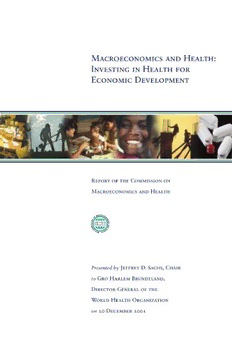
Macroeconomics and Health: Investing in Health for Economic Development PDF
213 Pages·2001·0.834 MB·English
Most books are stored in the elastic cloud where traffic is expensive. For this reason, we have a limit on daily download.
Preview Macroeconomics and Health: Investing in Health for Economic Development
Description:
In response to the need to place health at the centre of the development agenda, the Director-General of WHO appointed a Commission on Macroeconomics and Health consisting of a group of leading economists and health experts. The results of their work is presented in this report which offers a new strategy for investing in health for economic development, especially in the world's poorest countries. Based upon a new global partnership of the developing and developed countries the report states that timely and bold action could save at least 8 million lives each year by the end of this decade, extending the life spans, productivity and economic well being of the poor. Such an effort would however require two important initiatives: a significant scaling up of the resources currently spent in the health sector by the poor countries and donors alike; and tackling the non-financial obstacles that have limited the capacity of poor countries to deliver health services. In the report, the experts argue that the linkages of health to poverty reduction and economic growth are much more powerful than is generally understood. The report presents more scientific evidence than ever before to support the argument that health is critical to economic development in poor countries. Disease blocks economic growth. And a previously held argument - that health will automatically improve as a result of economic growth - is not supported by evidence. Diseases will not go away without specific investments in health interventions. Yet, the resources – human, scientific, and financial - exist to succeed, but now must be mobilized. The Commission also outlines a new global framework for access to life-saving medicines that includes norms on differential pricing schemes, broader licensing, and bulk purchase agreement. It also stresses that disease breeds instability and that rich countries are likely to benefit through greater political and social stability in the poor countries, by helping to control the diseases of the poor. Given that just a few conditions account for most of the health deficit, a few health steps could save millions of lives. There are existing, effective interventions for the prevention and control of these conditions, and large reductions in mortality and morbidity can be achieved almost anywhere, even in war zones, if financial resources are adequate. The report concludes that the benefits of the investment in global health would equal at least US $180 billion in direct economic benefits of extended healthy lifespan as of 2015-2020, and roughly the same amount due to faster economic growth, for a total economic gain of at least US $360 billion per year.
See more
The list of books you might like
Most books are stored in the elastic cloud where traffic is expensive. For this reason, we have a limit on daily download.
